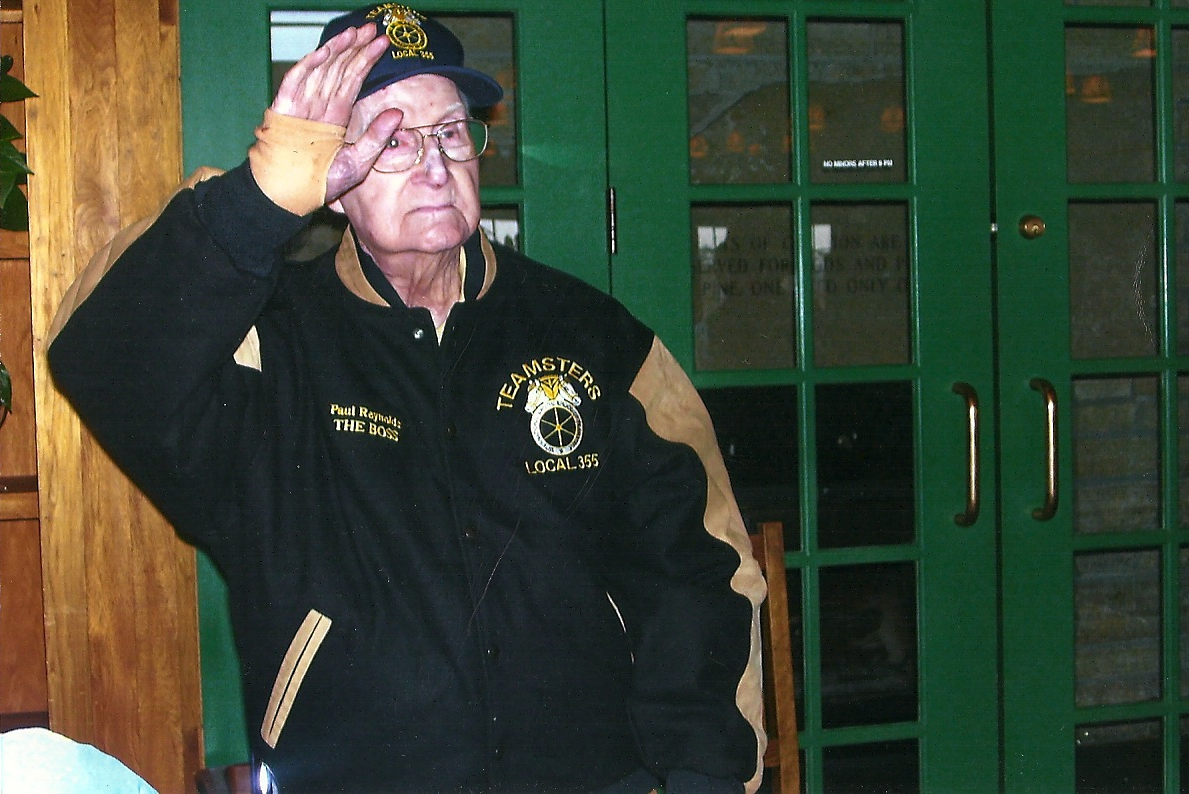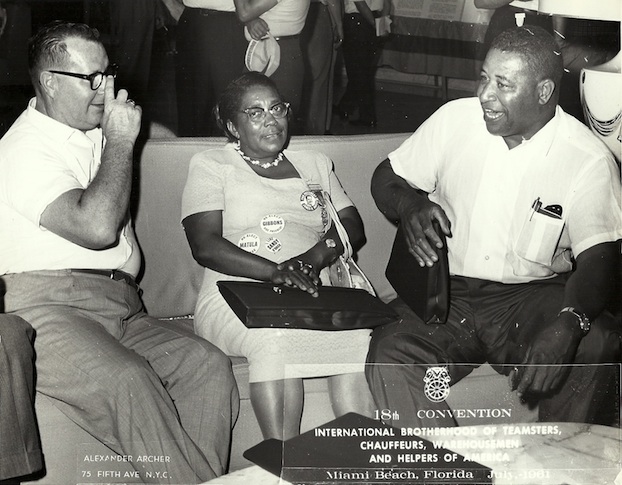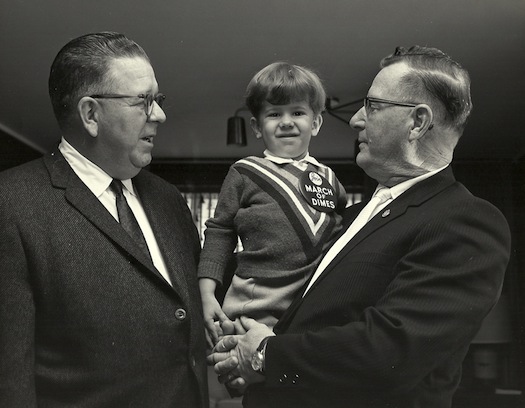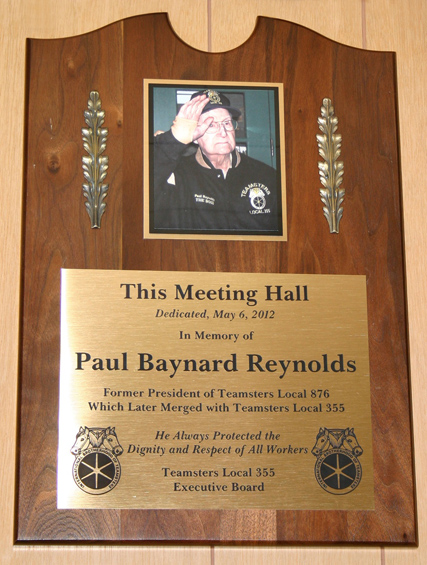|
Paul Reynolds, founder and president of Teamsters Local 876, a local that merged in 1984 with Teamsters 355, passed away January 8, 2012. He was 102 years old. Mr. Reynolds was a powerful inspiration to his family, friends and fellow Teamsters. His story comes to you in two parts. Information for the first article was provided by Reynolds' family members and fellow union members. The second can be found at Teamster Magazine and is based on a lengthy 2010 interview with him that was conducted by the International .

Retired Teamster Paul Reynolds loved driving trucks. Now 100 years old and residing in Nebraska, he intends to make one more road trip. He’s instructed his family that when his time here on earth is up he’s to be cremated and sent home to Salisbury, Maryland aboard a UPS Freight truck so in death he can make his final road trip as a proud Teamster – just as he was in life.
President for twenty-three years of Teamsters Local 876 in Salisbury, Reynolds dedicated his life to organizing the unorganized. Working the Delmarva Peninsula for Teamsters Local 107 and Teamsters Joint Council #53 out of Philadelphia, Reynolds traveled the rural areas of Delaware, Maryland and Virginia talking with and organizing workers who labored to gather and deliver poultry, vegetables and other goods produced in the region. Teamsters Local 876 with more than 800 members, was chartered in August 1949, culminating years of Reynolds’ long days and nights organizing workers on the Delmarva Peninsula.
Paul B. Reynolds was born April 13, 1909 in Philadelphia, PA to parents who divorced when he was very young. The family had moved to Greenwood, Delaware when his parents split up. His father died shortly thereafter, and his mother moved back to Philadelphia, leaving little Paul in the care of a relative. Abused and unhappy, Paul quit school in the fifth grade and ran away to Philadelphia. He did not find his mother, who by all accounts had opened a boarding house somewhere in the city, so he took a job working as a dishwasher in a restaurant owned by two brothers who were kind enough to provide the homeless young boy a pillow and a blanket, and allow him to sleep in the restaurant’s back room.
Reynolds enlisted in the U.S. Calvary, and like many young men eager to serve their country, he lied about his age to join. The Calvary was at that time the U.S. Army’s mounted force charged with security and reconnaissance. In 1926, not long before he was thrown out of the service when it was discovered he had lied about his age, Paul had the honor of being a dispatch rider (or runner) for the colonel in charge of security for President Coolidge during the country’s Sesquicentennial celebrations. The world’s fair –The Sesqui-Centennial International Exposition – honoring the one-hundred-fifty year anniversary of the signing of the Declaration of Independence, was hosted in Philadelphia.
In the late 1920s, Reynolds had made his way across the Delaware River to New Jersey where he got a job driving a truck for Campbell Soup. About his father’s initiation in to the union, Reynolds youngest son Bob wrote in an email: “While on a run to Philadelphia he was approached by two men – one on each running board [of the truck]. [He was] asked how much money he had, and was taken to the union hall [Teamsters Local 676, Camden, NJ] where he paid his initiation fee and dues. He became the steward [at Campbell’s], and after the inside union settled their contract for three cents, he went to management and asked for nine cents. It refused, and he struck them. It was settled fast, and he got the nine cents.”
Reynolds met Katherine, a fellow coworker at the plant, and in February 1931 they were married at St. John’s Church in Camden. Together they raised three children: Ronald, now deceased; Robert, currently living in Georgia; and Shirley Reynolds Weiland, a long-time resident of Salisbury, MD whose daughter Kathy works at the Nebraska assisted-living facility where Reynolds resides.
.jpg) Reynolds increasingly immersed himself in union activities. He moved the family from Camden to Bridgeville, Delaware in 1944 or 1945, and maintained an office in Georgetown to be closer to his organizing leads. The family moved again in 1952 to Eden, MD and sometime during 1953 or 1954, he moved Local 876’s office to Salisbury. Shirley remembers a father who was away much of the time during the years she and her brothers were growing up, but there were times when he’d bundle up the family to go off to an organizing meeting. On the occasions when meetings were held in the family home, it was understood that under no circumstances were the children to interrupt their father during a meeting with union people. Reynolds increasingly immersed himself in union activities. He moved the family from Camden to Bridgeville, Delaware in 1944 or 1945, and maintained an office in Georgetown to be closer to his organizing leads. The family moved again in 1952 to Eden, MD and sometime during 1953 or 1954, he moved Local 876’s office to Salisbury. Shirley remembers a father who was away much of the time during the years she and her brothers were growing up, but there were times when he’d bundle up the family to go off to an organizing meeting. On the occasions when meetings were held in the family home, it was understood that under no circumstances were the children to interrupt their father during a meeting with union people.
But on one occasion, Shirley recalled, she and her brothers were playing in the yard when eldest son Ronnie – racing at full tilt across the yard – fell, and slid sideways along the ground much like a baseball player might slide into a base, seriously injuring his arm when a half-buried piece of glass ripped a very deep and long gash along the back of his upper arm, up and over across his shoulder. In a panic, the children raced into the house and exploded in on their father’s organizing meeting. Furious, Reynolds bellowed for them to get out, but when he saw Ronnie’s very bloody wound, he snatched him up and raced out of the house with the rest of the family hot on his heels to the car and sped off to the hospital, leaving little Shirley alone with a stunned standing-room-only crowd of poultry workers in the family’s living room. Not knowing what to do or say, they all quietly left.
As a result of Reynolds’ relentless pace in chasing organizing possibilities, the local grew to represent more than 5,000 members by the early 1950s. In the early 1960s, with the help of the owner of H&H Poultry (now Mountaire of Delmarva, Inc.), he established the local health and welfare fund, and some years later worked with other employers to establish the Eastern Shore Pension Fund. Determined to provide as many benefits as possible for his members, Reynolds allegedly sought to open a health clinic to care for the local’s members, but his efforts to secure the building next door to the local’s office failed when union officers wisely decided it wasn’t a good idea for the local to get into the health care business.
 Reynolds was active on the regional and national Teamsters stage. He was the first president of Teamsters Joint Council #62, serving from 1964 until his retirement in 1972. He was a staunch supporter of Washington, D.C., Teamster Local 730 president John Cleveland (1911-1989), and Cleveland’s candidacy for International Vice President as the first African-American to sit on the International Union’s Executive Board. He wrote a personal endorsement to Convention delegates in support of Cleveland. Reynolds was active on the regional and national Teamsters stage. He was the first president of Teamsters Joint Council #62, serving from 1964 until his retirement in 1972. He was a staunch supporter of Washington, D.C., Teamster Local 730 president John Cleveland (1911-1989), and Cleveland’s candidacy for International Vice President as the first African-American to sit on the International Union’s Executive Board. He wrote a personal endorsement to Convention delegates in support of Cleveland.
From “John H. Cleveland: A Teamster’s Life, ” a biography by Joy M Copeland:
“At the 1971 convention in Miami, a letter had been written by a man named Reynolds from the Eastern Shore of Maryland, asking to place Cleveland’s name on the slate for the General Executive Board. Cleveland knew about the letter …”
Reynolds’ letter appeal did not render the desired result given the racial tensions of the time. But four years after Reynolds retired, Cleveland, with the unanimous consent of the Teamsters Twenty-first Convention, became the first black Teamster Vice President. (Cleveland will be inducted into Labor's International Hall of Fame May 20, 2010 in a ceremony in Detroit, MI.)
 Paul Reynolds – whose heroes were Thomas Jefferson, Franklin Roosevelt and Harry Truman – was an activist to his core, always seeking to empower people and improve their lives. His son Bob said, "Dad's proudest moment was when he was on the [November 1967] cover of 'Teamster Magazine' with [General President Frank] Fitzsimmons and the March of Dimes poster boy. His most difficult time was during the long, violent strike against Dulany Foods in Maryland." Paul Reynolds – whose heroes were Thomas Jefferson, Franklin Roosevelt and Harry Truman – was an activist to his core, always seeking to empower people and improve their lives. His son Bob said, "Dad's proudest moment was when he was on the [November 1967] cover of 'Teamster Magazine' with [General President Frank] Fitzsimmons and the March of Dimes poster boy. His most difficult time was during the long, violent strike against Dulany Foods in Maryland."
His only foray into the public office arena was a run for Maryland state senator sometime in the 1960s which Reynolds lost in a 3-way race. Undeterred, he took up the cause of other politicians he believed in. For example, he helped to get Paul Sarbanes elected to Maryland’s House of Representatives in 1970.
Reynolds retired in 1972 but remained actively involved with his union, serving as a union trustee on the Eastern Shore Pension Fund for twenty-five years after his retirement.
He also fulfilled his dream to get back on the road. Reynolds bought an Airstream trailer and behind the wheel again, he and Kathryn traveled the highways of America. They eventually purchased an RV, and when not roaming coast to coast, spent much of their off-the-road time in Ft. Myers, Florida.
Eleven years ago tragedy interrupted the travels of the wandering couple when Reynolds’ eldest son died suddenly. Ronnie had followed in his father’s footsteps – working his way up in the Teamster union ranks as an organizer and eventually becoming the president of the local his father founded. The family was devastated, no one more so than the senior Reynolds himself, said his daughter Shirley. He fell into a deep depression and when his wife Kathryn had a stroke, Reynolds knew his days on the road were over. He and his wife moved in with Shirley and her husband in Salisbury until Kathryn’s death in 2003.
Reynolds moved to a Nebraska care facility in 2004, and last April, in honor of his 100th birthday his children, children’s spouses, grandchildren and great-grandchildren travelled to Nebraska to celebrate with him. He was presented with a Teamster 355 jacket and hat, which he proudly wore during most of the festivities.
Shirley believes that her father is a wonderful example of how, if you're willing to work hard enough, you can go wherever you want in life. “Here was this little kid who ran away from home, had nothing by way of an education, but nonetheless moved up in the world by working hard and learning as much as he could along the way. He’s very, very smart, and nothing ever stopped him when he set out to do something. He put his life’s blood into his work: He ate, lived, breathed union.”
 With many members of Mr. Reynolds family in attendence, the member's meeting hall in Local 355's Salisbury, Md. office was dedicated to Mr. Reynolds during the May 2012 membership meeting. "Your father, grandfather, great-grandfather - and our brother - will forever be remembered here," Vice President Erv Williams told the family. "His proud legacy will live on." With many members of Mr. Reynolds family in attendence, the member's meeting hall in Local 355's Salisbury, Md. office was dedicated to Mr. Reynolds during the May 2012 membership meeting. "Your father, grandfather, great-grandfather - and our brother - will forever be remembered here," Vice President Erv Williams told the family. "His proud legacy will live on."
Most of you know me as a man of few words. But when I look at the life of Mr. Paul Reynolds, and the body of work that he produced during his career, I must speak to a few of his many accomplishments.
Over the span of his personal and professional work life, Mr. Reynolds has been a mentor to many, including me. He exhibited the hard work, commitment, perseverance, and care for others that showed me how one can make a difference in working people's lives.
In life, people will add to or subtract from, multiply or divide our lives. Brother Reynolds added to and multiplied many fold with the contributions he made that improved so many of our lives for the better.
Mr. Reynolds continues to help others. He called me a few years ago to tell me he needed union organizing cards so he could help the workers at the senior home where he lives, to "correct some problems here." He had taken on the responsibility to act as a representative, helping to handle grievances for the staff and other residents. Mr. Reynolds is a giver. He went out of his way to give all the staff at the facility Christmas gifts in the form of words of encouragement.
He has provided a wealth of information related to prior contract employers, as well as the history of the union in Salisbury. I have been told that if you don't know your past, you are bound to repeat past mistakes. Thanks to Mr. Reynolds, we know our past.
As an organization, Joint Council #62 was truly blessed to have the leadership of Council past president Brother Reynolds. Like him, the current Council president, Brother Denis Taylor, has the vision and insight to move the Joint Council forward so the local unions will continue to grow and be relevant for the working people of Teamsters Local Union #355, and Joint Council #62.
Benjamin Franklin said "Words may show a man's wit but actions, his meaning." I am proud and grateful to call Brother Paul Reynolds – my brother.
– Ervin Williams, Vice President, Teamsters Local 355
I first met Mr. Reynolds in 1994 when he was a convincingly-young 85 years old and I was thoroughly impressed with his wit and tenacity. As an Eastern Shore Pension Fund labor trustee, he was eager to monitor and question professionals involved with the Plan that he helped establish in the 1950s. He maintained a dedication to the welfare of the fund and its participants that was unparalleled. Mr. Reynolds, when asked, was quick to share the knowledge that he had gained in over 50 years of working in organized labor. He was an Eastern Shore gentleman that was always polite and unassuming. I recall numerous conversations where I would try to “pick his brain” for my own gain.
Mr. Reynolds, on behalf of myself, and the thousands of members on whose lives you made a lasting impact – thank you!
– Dave White, Secretary-Treasurer, Teamsters Local 355
I met Brother Reynolds in early 1970 when I became an officer of Local 992 in Hagerstown, MD. At that time he was president of Joint Council #62 in Baltimore. Local 992 was affiliated with the Joint Council.
I will always remember his willingness to travel to Hagerstown to assist during our difficult times organizing new members. With his help and expertise we were successful with our growth and our service to our members.
His organizing and administrative abilties were always very impressive, and had a profound affect on my tenure as an officer of Local 992, and later as a representative of the Eastern Conference of Teamsters.
My sincere thanks again for all his help those many years ago. My warmest regards for his good health and happiness.
– Harrison (Tiny) L. Lushbaugh, Retired,Teamsters Local 992
If you would like to contribute a testimonial in honor of Paul Reynolds, you may submit it via email to teamstersjc62@gmail.com, or drop it in the mail to:
Paul Reynolds Testimonial
Teamsters Local 355
1030 S. Dukeland Street
Baltimore, MD 21223.
Please include your contact information.
|